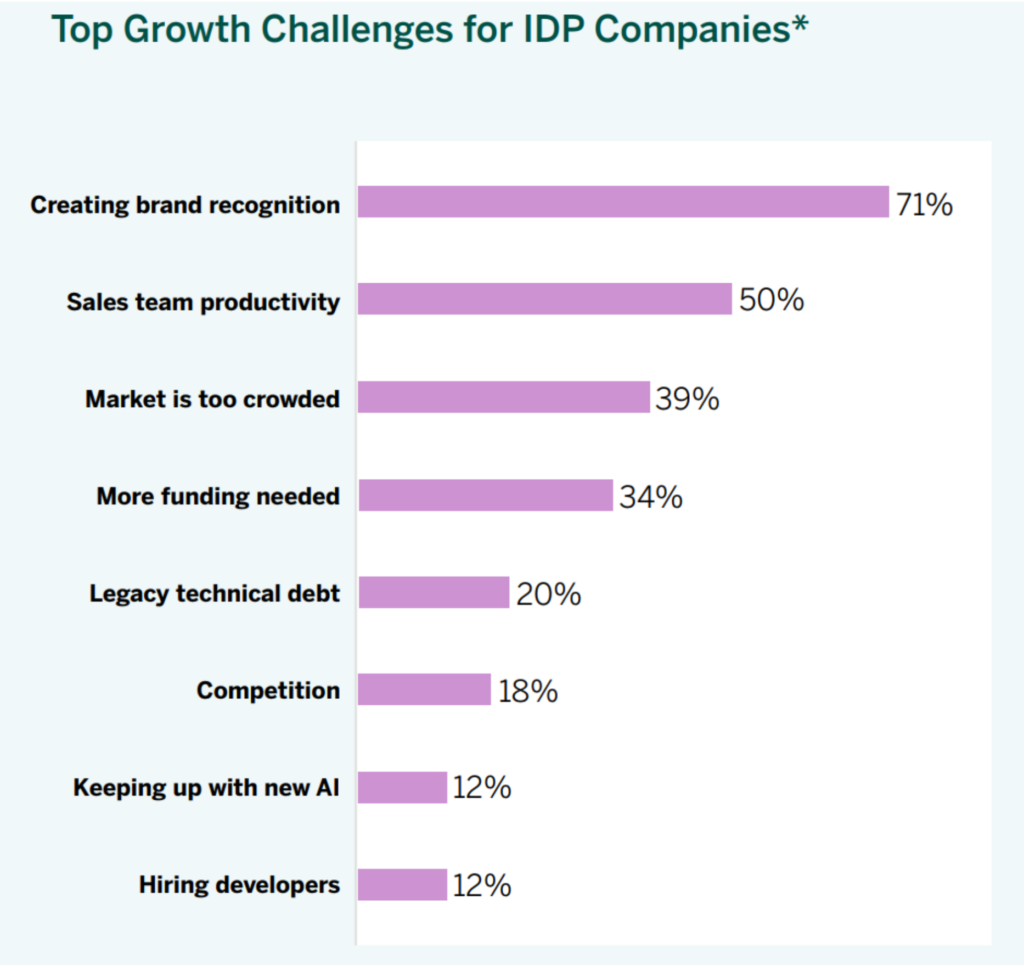Curious about what keeps experts, CEOs and other decision-makers in the Intelligent Document Processing (IDP) space on their toes? Get food for thought on IDP-related topics from the industry’s leading minds.
In this opinion piece, Dan Lucarini, Senior Analyst at Deep Analysis, analyses the results of a private survey conducted by the analyst firm of 52 software companies who make intelligent document processing (IDP) products.
Earlier this year Deep Analysis published the findings from its private survey of 52 software companies who make intelligent document processing (IDP) products. The products involved in the survey ranged across the IDP spectrum, from end-to-end IDP platforms like Hyperscience, Tungsten (Kofax) and UiPath, to document AI APIs offered through the cloud.
Survey respondents were asked to rank their top three growth challenges from the following list:
- Competition
- Market is too crowded
- More funding needed
- Keeping up with new AI
- Creating brand recognition
- Hiring developers
- Sales team productivity
- Legacy technical debt
Results summary
- Creating brand recognition was the top choice. 71% ranked it in their top three.
- Sales team productivity came in second. No one rated this #1, but 50% ranked it #2 or #3.
- Market is too crowded came in third. 39% ranked this in their top three.
- More funding needed was close behind in fourth place. 34% ranked this in their top three.

Analysis of the results
Challenge #1: Creating Brand Recognition
It should come as no surprise to industry observers that brand recognition is seen as the top challenge to IDP vendors. The industry (as reflected in the survey responders) consists of hundreds of startups that must work hard to create a market brand and niche. Some of the longtime incumbent brands (Tungsten Automation (Kofax), ABBYY, OpenText, and IBM) are so well known they do not face this problem and will typically make every IDP RFI shortlist with little to no marketing effort.
There is no cheap and easy way to create brand recognition. It takes money and personal time. The well-funded IDP startups have hired CMOs who invest millions into campaigns and thought leadership programs (including with analysts like Deep Analysis). Less funded or bootstrapped startups struggle to build brand recognition. Thanks to free social media, some brand building can be done with a small budget and one person driving the content. But it takes time, persistence and infinite patience.
Challenge #2: Sales Team Productivity
We were not surprised that sales team productivity ranked so high. Every responding vendor was at least two years old. In many cases, they hired an experienced enterprise software sales leader who then hired new salespeople with no prior experience selling IDP. After 6 months of cash burn with no new revenue, CEOs and investors can become very impatient. This approach has a high rate of failure.
From our own experience managing sales teams in the B2B software market, we understand the significant amount of time and effort it takes to train and ramp up a new salesperson to reach the desired level of productivity. Most of the IDP products we cover are very complex technical platforms that integrate with enterprise systems, so the sales cycles are going to be longer. We regularly advise software startups on how to build a sales team, and we caution that it will take at least 6 months for a new sales rep to build a defensible pipeline (not one of “hopefuls” and “nope-fuls”), and at least 12 months to start closing business at the company’s quota rates.
As with creating brand recognition, this can turn into another cash-burn project. Bootstrapped startups cannot compete with well-funded startups that can invest millions and afford to wait for a return on investment 15-18 months down the road. The funded startups are also the ones that hire too many too fast, and when revenue fails to cover the sales team expense after 12 months, investor-led boards can be ruthless with pressure to cut jobs.
Challenge #3: Market Too Crowded
Deep Analysis was the first analyst firm to call this out in our ground-breaking 2023 IDP Market Report. We now track over 400 software vendors and system integrators offering an “IDP” solution. There are simply too many vendors with the same message chasing after the same business.
Many startups we interview have the same business plan, easily summed up as:
- We do invoices better.
- We’re going after Kofax (now Tungsten), or ABBYY, or OpenText, or another legacy brand).
These business plans are destined to fail.
We’re not saying you should not try to go after invoice processing, but if your goal is to take down the entrenched competitors who have the brand, the big sales network, and the deep and wide product offerings, then you must first spend the money and time to build out a competitive business structure of your own. Or better yet, find a way to disrupt the market.
Rossum is a textbook example of how to disrupt the invoice processing market and build a credible business. From the start, Rossum did not attempt to compete head-to-head against the giants. Instead, the company exploited an unmet need in the market – the lack of cloud-based IDP APIs. Launched around 2016, its cloud native offering was quickly adopted by accounting teams who could not afford the cost, the hassle, and the time to stand up one of the existing on-prem software offerings. Rossum built a direct relationship with thousands of A/P workers, and as a result today’s offering is full of customer delight.
Finally, differentiation is the key to early success. In the crowded IDP market, a startup has no real chance to pass $10 million a year unless it can build credibility, trust, and success within a document automation niche.1 Successful examples abound in our coverage; follow us on LinkedIn or subscribe to our newsletter to keep up with the latest company profiles.
- For more reading on the importance of focusing your company within a crowded market: The Power of Market Focus ↩︎

About the Author
Dan Lucarini is a senior analyst at Deep Analysis, the leading research firm for unstructured data management technology. Prior to this, he was a successful startup entrepreneur and a product and sales management executive for industry leaders Kofax and OpenText. Dan lives in Cornwall, UK.
📨Get IDP industry news, distilled into 5 minutes or less, once a week. Delivered straight to your inbox ↓








